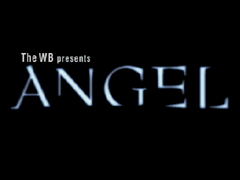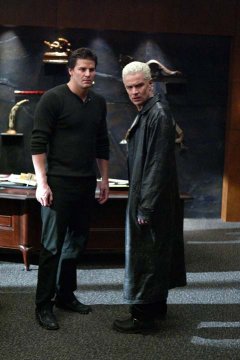Angel
Just Rewards
original air-date: 10-08-03
Forget
the unified field theory or string-based dimensional models.
Theoretical physicists should instead tackle the question
of why ghosts, demi-ghosts (meaning both those part ghost
and the marital Patrick Swayze role), and even out-of-phase
Star Fleet officers pass through walls, desks, and ficus trees,
yet never fall through the floor.
Here the
demi-ghost in question is Spike. Apparently the same amulet
that enabled him to stave off the ubervamp army stored him
as property of Wolfram and Hart (kind of like magic Tupperware).
A well
intended flashback shows us Spike's final moments in the Hellmouth.
But the scene is pointless because it doesn't add any information
(except perhaps to show that for Spike, no time has passed;
he has not been vacationing in Hell, Quartoth, or Cabo). Even
for the two or three Angel fans who didn't watch Buffy,
it doesn't provide any of the Buffy back-story (though
some Lorne exposition later might help the clueless viewer).
At the least the scene is interesting in that it may be the
only time in the Whedonverse when the writers specifically
define a period of elapsed time.
Upon release
from the amulet, Spike immediately vamps out and lunges at
Angel. This makes no sense given Spike's change of heart,
er, soul on Buffy. Sure he's disoriented. But there's
enough of a pause so that there's no way Spike should mistake
a plush office full of Fang Gang for a Hellmouth cavern full
of Ubervamps. And sure, Spike and Angel have always been rivals.
But to attack Angel? At least the upside was a funny shot
with a desk.
Throughout
the episode fans learn a few key facts about Spike's return.
He's not a ghost per se, he's bound to Wolfram & Hart
(and thus can't leave L.A.), and he may be "slipping"
towards that place "where heroes don't go."
Fans also
learn that James Marsters continues to shine in the role as
Spike continues to evolve. Here some of the best work is subtle,
e.g., how the good Spike ignores Harmony, or playfully self-referential
to the show itself, e.g., Spike playing the role of the concerned
fan wondering if Angel will now fight via the IRS or if he
himself will be the annoying comical sidekick ghost.
Meanwhile,
it's also fun to see Angel on the defensive. As is often the
case, characters are most entertaining when forced out of
their comfort zone.
While
binctering (bantering + bickering = binctering) with Spike,
Angel must deal with another unhappy client, the necromancer
Magnus Hainsley, who has power over the dead (and likes to
remind people of that fact). Unlike Hauser or last week's
villain, this bad guy has enough personality (as well as a
creepy showroom and power over the dead) to be entertaining.
Perhaps
the difference is casting a seasoned sitcom character actor;
among many minor roles, this guy once tormented Pete as a
fire chief on ABC's underappreciated Two Guys and A Girl.
Hainsley,
who has power over the dead, is unhappy that Angel wants to
put the kibosh on W&H's cadaver procurement program (dead
people are useful to Hainsley because he has power over the
dead).
Though
there is a twist most fans will see a mile away, the simple
plot works well enough. Overall, the episode is solid with
a few minor exceptions. One weak spot is the low quality costuming
for the Groxlar demon (Angel's client) and the recurring mail
clerk (in contrast, the costume for Hainsley's demon client
is excellent).
The other
weak spot is potentially more serious: Pushing aside Wes and
Lorne as key characters (ironic that Andy Hallet finally made
the opening credits). Harmony is on the cusp: Sure she's fun,
bet hopefully the writers will continue to throttle back her
involvement lest the fans seek a stake. Sometimes less is
more.
Oh, and
Hainsley has power over the dead.
|







